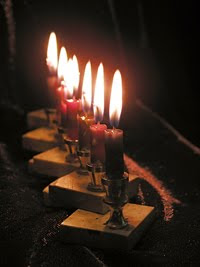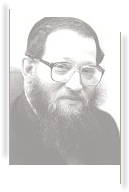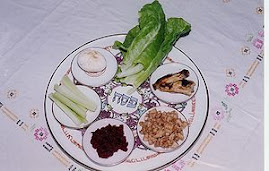Thursday, June 30, 2011
The pain of seeing our mistakes.
Rebbitzen Kalmanowitz - Chovos Halevavos Shiur in Monsey
Sunday, June 19, 2011
The Gift of Abstinence
Thank You HaShem, words just aren’t enough
There’s no way I could have done this without Your love
I came to meetings and listened to people share
Made outreach calls to women who care
They said “keep coming back – the gift will come”
Gave me hope and encouragement when I had none
I wanted to do it my way but finally had to admit
I needed to let go of controlling life as I wanted it
I heard people with serenity and I wanted that too
But I couldn’t understand why I had to leave the food
Why can’t I eat what I want and connect to HaShem?
But no matter how I tried, I couldn’t be like them
I wanted to meditate, to get up early and daven
To say Brachos over food, and not need to repeat them
To be patient and kind and present for my family
to stop fighting with myself over food constantly
But I still had self will, and I couldn’t let go
Still kept on thinking I needed to run the show
And then suddenly it came – I really don’t know how
HaShem gave me the willingness to start right now
42 days later – I can’t believe it’s true
Abstinence is a gift that can only come from You
Weighed and measured, my food is clean
Nothing in between – not one little bean
It sounded so restricting, so harsh and so strict
But this freedom from choice is truly a gift
No more “i can have a little now – lunch was quite small”
Or “I really need more, I wasn’t so full!”
I now know clearly when the food thoughts come
That really I need to connect to someone
I turn to HaShem and ask what I should do
Trying to fulfil His Ratzon as a good Jew
I try to meditate each and every day
On three healthy meals – Brachos I say
I’ve got a long way to go in my Avodas HaShem
But I’m so grateful each day that I can start again
No longer am I going to bed so full of self-hate
Scared to wake up and deal with my “fate”
Struggling and struggling with no peace in sight
This way gives me clarity – it really feels right
I daven for you all that you’ll get the gift too
And that I’ll hold on to the willingness to do what I have to do ...
With much love to you all in recovery,
FROM AN ANONYMOUS READER
Wednesday, June 15, 2011
Tuesday, June 14, 2011
To merit a hidden light that no angel can fathom.
 The Chofetz Chaim quotes a midrash which states that every time a person refrains from engaging in forbidden speech, they merit a hidden light that no angel can fathom. And that midrash is talking about a single moment; one can only imagine what lies in store for a person who can hold back from speaking ill of others on a consistent basis. Obviously, we should strive for good behavior simply because it's the right thing to do. But if you need a little incentive, that's a pretty good one.
The Chofetz Chaim quotes a midrash which states that every time a person refrains from engaging in forbidden speech, they merit a hidden light that no angel can fathom. And that midrash is talking about a single moment; one can only imagine what lies in store for a person who can hold back from speaking ill of others on a consistent basis. Obviously, we should strive for good behavior simply because it's the right thing to do. But if you need a little incentive, that's a pretty good one.Remaining silent has divine origins. The Talmud (Gittin 56b) evokes the praise of God following the Second Temple's destruction as "mi kamocha ba'ilmim Hashem" - "Who is like You among the mute ones O God" (this is a play on words of the phrase "mi kamocha ba'eilim Hashem" - "Who is like You among the mighty ones, O God"). It is referencing how God remained silent in the face of the profane conduct of Titus. This is the Creator of the Universe we're talking about - and it's concerning the destruction of His home on earth - and yet He's willing to exercise restraint! All we have to do is let go of our egos a little bit and try in our own small way to emulate God's characteristics when someone happens to say or do something that personally offends us.
Making our displeasure known with those with whom we disagree is often not worth it. Do we really have to get in our two cents every time we come across some subjective difference with a fellow Jew? Even when someone has objectively hurt us in some way, we have to make sure that our subsequent behavior is constructive. Unless we're fairly certain that rebuking them would have a positive effect, it's best to maintain our composure and simply keep quiet. All we can do is make the best decision based on the information we have at the time. Sometimes we'll still make a poor choice despite thinking before speaking, but at least we'll be more cognizant of our behavior and less likely to hurt someone else.
Sunday, June 12, 2011
Hidden reality.
Sometimes when we play hide and seek with a baby, the baby thinks you really aren't there if they cant see you. In the same way, we often feel like Hashem is not there because we can not see him. But just like the baby learns that the person was really there, we have to know that Hashem is really there all of the time.
from a Shiur on Naaleh: Perek 39: Gog's End
Teacher: Rebbetzin Tziporah Heller Class: Yechezkel II
Added: May 23, 2011
I have been going through a very difficult time lately. Knowing that nothing is random and everything is from Hashem has kept me going.
Wednesday, June 1, 2011
Tefillat HaShlah -
 The Shlah wrote that the eve of the first day of the Hebrew month of Sivan is the most auspicious time to pray for the physical and spiritual welfare of one's children and grandchildren, since Sivan was the month that the Torah was given to the Jewish people. He composed a special prayer to be said on this day, known as the Tefillat HaShlah - the Shlah's Prayer.
The Shlah wrote that the eve of the first day of the Hebrew month of Sivan is the most auspicious time to pray for the physical and spiritual welfare of one's children and grandchildren, since Sivan was the month that the Torah was given to the Jewish people. He composed a special prayer to be said on this day, known as the Tefillat HaShlah - the Shlah's Prayer. 































